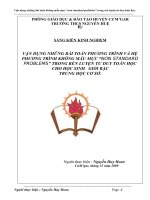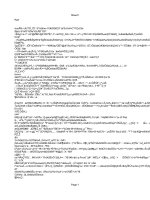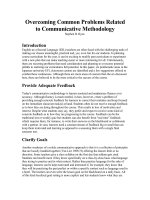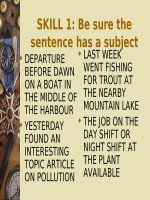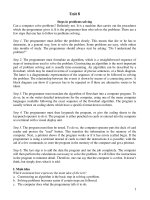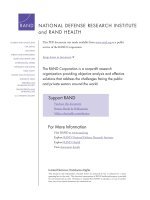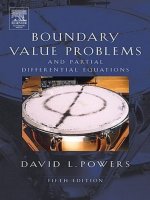- Trang chủ >>
- Luật >>
- Luật thương mại
potential environmental problems
Bạn đang xem bản rút gọn của tài liệu. Xem và tải ngay bản đầy đủ của tài liệu tại đây (1.59 MB, 29 trang )
Potential Environmental Problems
Potential Environmental Problems
A. Mining operation itself
A. Mining operation itself
–
Disposal of a large amount of rock and waste
Disposal of a large amount of rock and waste
–
Noise
Noise
–
Dust
Dust
Beneficiation
Beneficiation
Smelting and refining
Smelting and refining
From Underground Mining
From Underground Mining
Subsidence
Subsidence
–
Block/caving
Block/caving
–
Room and pillar
Room and pillar
–
Salt mining
Salt mining
Subsidence in rancher’s field
Subsidence in rancher’s field
Subsidence from Pb-Zn mining
Subsidence from Pb-Zn mining
From Underground
From Underground
Acid Mine Drainage
Acid Mine Drainage
–
FeS minerals in coal
FeS minerals in coal
–
Sulphide deposits
Sulphide deposits
–
Acidic streams can pick up heavy elements
Acidic streams can pick up heavy elements
and transport them
and transport them
Rock that has acid forming material
Rock that has acid forming material
Drainage
Drainage
Acid and open pits
Acid and open pits
Berkley Pit
Other problems with open pits
Other problems with open pits
Very large holes
Very large holes
Pit slopes steep and not stable. Cannot
Pit slopes steep and not stable. Cannot
be maintained
be maintained
May fill with water
May fill with water
Strip coal mines –loss of top soil in past
Strip coal mines –loss of top soil in past
–
Now smoothed out and top soil added
Now smoothed out and top soil added
Disposal of Waste Rock
Disposal of Waste Rock
More problematic for open pit than
More problematic for open pit than
underground
underground
Waste rock piles have steep angle of
Waste rock piles have steep angle of
repose and thus may not be stable
repose and thus may not be stable
Bingham in its hay day produced 400,000
Bingham in its hay day produced 400,000
tons of waste rock per DAY!
tons of waste rock per DAY!
Tailings ponds
Tailings ponds
From concentrating usually have high pH
From concentrating usually have high pH
–
At Bingham acid waters mixed with tailings
At Bingham acid waters mixed with tailings
water to neutralize
water to neutralize
Different metals have different problems
Different metals have different problems
Problems with Smelting/Roasting
Problems with Smelting/Roasting
Air: SO
Air: SO
2
2
and CO
and CO
2
2
and particulate matter
and particulate matter
Noranda Quebec used to have the highest
Noranda Quebec used to have the highest
single point source of SO
single point source of SO
2
2
in the world. It
in the world. It
may have been surpassed.
may have been surpassed.
CN (Au); NaOH and F (Al); solvents
CN (Au); NaOH and F (Al); solvents
(electrotwinning); heavy metals; oil and
(electrotwinning); heavy metals; oil and
grease
grease
Environmental Impact
Environmental Impact
Environmental impact
Environmental impact
–
From mineral exploration and testing
From mineral exploration and testing
–
From mineral mining
From mineral mining
–
From mineral resources refining
From mineral resources refining
–
From mining waste disposal
From mining waste disposal
Environment Impact of Mineral
Environment Impact of Mineral
Development
Development
The impact depends upon many factors:
The impact depends upon many factors:
–
Mining procedures
Mining procedures
–
Hydrologic conditions
Hydrologic conditions
–
Climate factors
Climate factors
–
Types of rocks and soils
Types of rocks and soils
–
Topography
Topography
Also population: NIMBY
Also population: NIMBY
Impact of Mineral Exploration and Testing
Impact of Mineral Exploration and Testing
Mineral exploration and testing
Mineral exploration and testing
–
Surface mapping, geochemical, geophysical, and
Surface mapping, geochemical, geophysical, and
remote-sensing data collection
remote-sensing data collection
–
Test drilling
Test drilling
Impact
Impact
–
Generally minimal impact
Generally minimal impact
–
More planning and care needed for sensitive areas
More planning and care needed for sensitive areas
(arid, wetlands, and permafrost areas)
(arid, wetlands, and permafrost areas)
General impact
General impact
Direct impact on land, water, air, and
Direct impact on land, water, air, and
biological environment
biological environment
Indirect impact on the environment:
Indirect impact on the environment:
Topographic effect, transportation of
Topographic effect, transportation of
materials, etc.
materials, etc.
Impact on social environment: Increased
Impact on social environment: Increased
demands for housing and services
demands for housing and services
Impact of Mineral Extraction
Impact of Mineral Extraction
and Processing (1)
and Processing (1)
Impact of Mineral Extraction
Impact of Mineral Extraction
and Processing (2)
and Processing (2)
Impact from mining operations
Impact from mining operations
–
Land disturbances; e.g.,
Land disturbances; e.g.,
–
Waste from mines: 40% of the mining area for waste
Waste from mines: 40% of the mining area for waste
disposal, mining waste 40% of all solid wastes; e.g.,
disposal, mining waste 40% of all solid wastes; e.g.,
,
,
–
Special mining, e.g., chemical leaching from gold mining;
Special mining, e.g., chemical leaching from gold mining;
e.g.,
e.g.,
–
Mining acid drainage, during mining and post-mining; e.g.,
Mining acid drainage, during mining and post-mining; e.g.,
New World district
New World district
Berkeley Pit.kmz
ASARCO tailings.kmz
Chico placer.kmz
Golden Sunlight.kmz
Mclaren ta ilings.kmz
Impact of Mineral Extraction
Impact of Mineral Extraction
and Processing (4)
and Processing (4)
Water pollution
Water pollution
–
Trace elements leaching out into water, such
Trace elements leaching out into water, such
as Cd, Co, Cu, Pb, Mo, Zn
as Cd, Co, Cu, Pb, Mo, Zn
–
Flooding of abandoned mines, oxidation of
Flooding of abandoned mines, oxidation of
sulfide ores = sulfuric acid
sulfide ores = sulfuric acid
–
Acid mine drainage from tailings
Acid mine drainage from tailings
Pollution of water from mining
Pollution of water from mining
Minimizing the Impact of
Minimizing the Impact of
Mining (1)
Mining (1)
Knowledge and technology transfer: developed
Knowledge and technology transfer: developed
countries to developing countries
countries to developing countries
Environmental Regulations:
Environmental Regulations:
Forbid bad mining
Forbid bad mining
practices, Clean Air Act, and on- and offsite
practices, Clean Air Act, and on- and offsite
treatment of wastes
treatment of wastes
Land reclamation:
Land reclamation:
A
A
bout 50% of land used in mining
bout 50% of land used in mining
industry reclaimed
industry reclaimed
Use of new biotechnology in mining:
Use of new biotechnology in mining:
Bio-oxidation,
Bio-oxidation,
bioleaching, biosorption, genetic engineering
bioleaching, biosorption, genetic engineering
Figure 14.14
Figure 14.14
Minimizing the Impact of
Minimizing the Impact of
Mining (2)
Mining (2)
Recycling Mineral Resources (1)
Recycling Mineral Resources (1)
Why recycle? Consider the impact of the
Why recycle? Consider the impact of the
wastes
wastes
–
Toxic to humans
Toxic to humans
–
Dangerous to natural ecosystems
Dangerous to natural ecosystems
–
Degradation of air, water, and soil
Degradation of air, water, and soil
–
Use of land for disposal
Use of land for disposal
–
Aesthetically undesirable
Aesthetically undesirable
Waste contains recyclable materials
Waste contains recyclable materials
Saves energy, money, land, raw mineral
Saves energy, money, land, raw mineral
resources from more mining
resources from more mining
Saves energy and money when recycling
Saves energy and money when recycling
instead of refining raw ore materials
instead of refining raw ore materials
Recycling has been proven to be profitable
Recycling has been proven to be profitable
and workable
and workable
Recycling Mineral Resources
Recycling Mineral Resources
(2)
(2)

